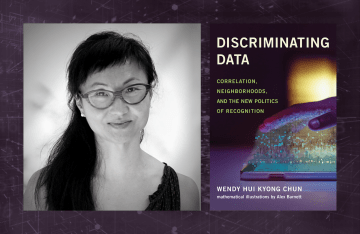
Book Talk: Wendy Hui Kyong Chun, Simon Fraser University
- Virtual Event
Discriminating Data: Wendy Hui Kyong Chun in Conversation with Sarah Banet-Weiser
This event will be held via Zoom at upenn.zoom.us/my/ascmediarisk beginning at 12:30pm EST.
In Discriminating Data: Correlation, Neighborhoods, and the New Politics of Recognition, Wendy Hui Kyong Chun reveals how polarization is a goal—not an error—within big data and machine learning. These methods, she argues, encode segregation, eugenics, and identity politics through their default assumptions and conditions. Correlation, which grounds big data's predictive potential, stems from twentieth-century eugenic attempts to “breed” a better future. Recommender systems foster angry clusters of sameness through homophily. Users are “trained” to become authentically predictable via a politics and technology of recognition. Machine learning and data analytics thus seek to disrupt the future by making disruption impossible.
Chun, who has a background in systems design engineering as well as media studies and cultural theory, explains that although machine learning algorithms may not officially include race as a category, they embed whiteness as a default. Facial recognition technology, for example, relies on the faces of Hollywood celebrities and university undergraduates—groups not famous for their diversity. Homophily emerged as a concept to describe white U.S. resident attitudes to living in biracial yet segregated public housing. Predictive policing technology deploys models trained on studies of predominantly underserved neighborhoods. Trained on selected and often discriminatory or dirty data, these algorithms are only validated if they mirror this data.
How can we release ourselves from the vice-like grip of discriminatory data? Chun calls for alternative algorithms, defaults, and interdisciplinary coalitions in order to desegregate networks and foster a more democratic big data.
Join Wendy Hui Kyong Chun, in conversation with Sarah Banet-Weiser with an introduction by Barbie Zelizer, co-sponsored by the Center for Media at Risk and the Center for Collaborative Communication.
Receive 10% off your purchase of Discriminating Data: Correlation, Neighborhoods, and the New Politics of Recognition with Coupon Code: MIT10
Please note that this discount code only works for customers in the US and can only be applied when purchased from Penguin Random House.
Events
View AllDisclaimer: This event may be photographed and/or video recorded for archival, educational, and related promotional purposes. We also may share these video recordings through Annenberg's website or related platforms. Certain events may also be livestreamed. By attending or participating in this event, you are giving your consent to be photographed and/or video recorded and you are waiving any and all claims regarding the use of your image by the Annenberg School for Communication. The Annenberg School for Communication, at its discretion, may provide a copy of the photos/footage upon written request.
